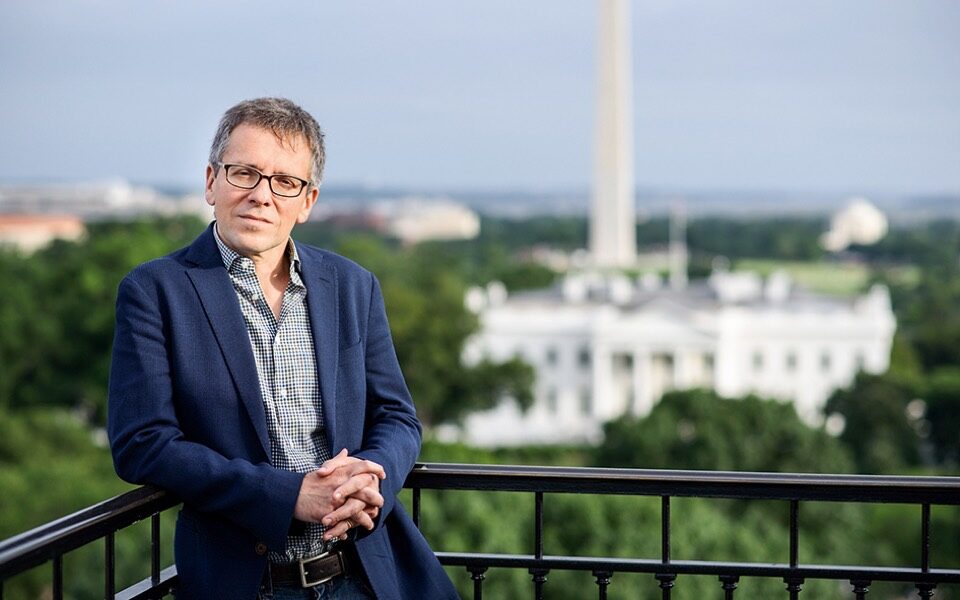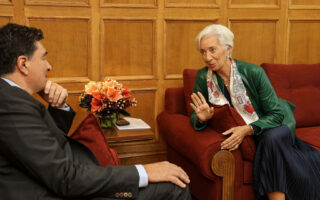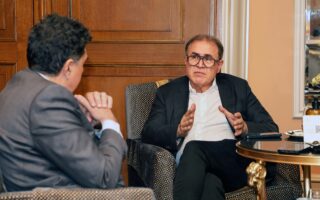Greece, the world’s best turnaround story
From US and EU politics to the wars in Ukraine and Gaza, the Eurasia Group president sees little to be upbeat about in 2024

Ian Bremmer, founder and president of Eurasia Group, lauds Greece as “the world’s best turnaround story” for the past year in this interview with Kathimerini. During the discussion, he provides his projections for 2024 regarding the trajectories of major countries and ongoing conflicts around the world.
Bremmer depicts the challenging situation facing the United States, labeling it as the most “dysfunctional” political system, particularly as the nation enters a pivotal election year. He delves into the demanding landscape confronting Beijing and the strained European economy, emphasizing the robust supranational governance system as a crucial safety valve.
However, his outlook is less than optimistic regarding the unfolding developments in the two most reported global conflicts. In Ukraine, he perceives no likelihood of victory for Kyiv, while in Gaza, he explores the potential escalation of hostilities and the inherent risks associated with the radicalization of all involved parties.
What are your predictions for the US, the world’s largest economy, and the upcoming elections?
The US economy looks to be the strongest of the world’s developed economies at a time that China’s is particularly vulnerable. Not so the political system, which is the most dysfunctional of the G7 (and by an increasingly long margin). One of the few things Americans agree upon is they’d rather not have elections this year, and especially not between the two expected candidates. Not what you want to see leading the news for 2024.
What about China, the second largest economy, and its relations with the US and Europe?
A troubled economy in China on almost every front. The good news is that the leadership is stable, consolidated and aware. The bad news is short of dramatic and transformative reform (which Xi has no intention of implementing) – it’s not going to improve anytime soon. That helps to underpin a desire to have more stable relations with the United States and Europe, but the absence of trust and plenty of areas of conflict – especially around tech and industrial policy – make it a challenging environment.
How do you see the war in Ukraine progressing, and Russia’s stance?
An inflection point in the war, with the Ukrainians no longer on a path to “winning” and the war decidedly off the headlines, especially outside Europe. Not the news you want to hear if you’re Zelenskyy… or Poland. The peak of NATO was in 2023 and that was the case for transatlantic relations. Keeping Europe and the US onside will be a growing struggle, and Putin knows it.
What about the other major conflict today, the war in Gaza?
Lots of ways this can get worse – expansion to the West Bank and Lebanon, trouble with Iran proxies, radical Islamic terrorism, you name it. Meanwhile, both Israel and the Palestinians have become more radicalized from the fighting.
‘The Europeans are lucky they have a strong supranational system of governance – the European Union – or otherwise this would feel like a crisis’
Getting closer to home, give us your views on Europe, its economy, and some of the major issues facing it – migration, expansion of the Western Balkans, Ukraine…
An economy that will remain under strain from higher input costs, need for higher defense spending, headwinds from US and other industrial policies, and political infighting over Ukraine’s reconstruction and immigration. The Europeans are lucky they have a strong supranational system of governance – the European Union – or otherwise this would feel like a crisis. As it stands it’s remarkably politically stable, even under growing political, economic, social and security pressure. At least for now…
How are things in the UK, with Labour getting ready to govern?
Pretty straightforward shift of power, as Labour is set for an absolute majority. Prospects for more stable relations with the European Union accordingly.
In which direction do you see Turkey moving, economically and geopolitically?
Finally a competent economic team, and no time too soon. With Erdogan giving them reasonable ability to make decisions, especially because he’s in a stronger position vis-a-vis a fractured domestic opposition and plenty of geopolitical opportunities in the region.
Speaking of Turkey, how do you see Sweden’s accession into NATO going?
Ultimately this shouldn’t prove controversial. Turkey is looking to get as much leverage as it can but not break the process. We’ve been through this before.
Finally, your views on the image and prospects of Greece?
Well deserved as the Economist’s “country of the year” in 2023. Popular leadership, tough reforms, and the world’s best turnaround story.





